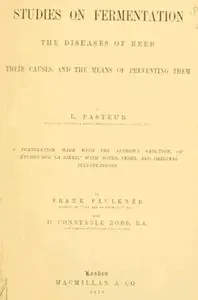"Studies on Fermentation" by Louis Pasteur is a scientific publication written in the late 19th century. The work delves into the microbiological basis of fermentation, particularly focusing on the diseases that can affect beer and the prevention methods based on Pasteur’s research. It is a pioneering effort in understanding fermentation processes and their implications for the brewing industry. The opening of the text introduces the author’s motivations stemming from the challenges faced by the brewing industry, particularly following the Franco-Prussian War. Pasteur discusses the importance of his research in finding solutions to prevent spoilage caused by undesirable microorganisms during the brewing process. He explains the essential role of temperature and the careful handling of ingredients to maintain the purity of the fermentation process. This section sets the foundation for a deeper exploration of the microscopic organisms responsible for beer spoilage and outlines the practical applications of his findings, promising insights that would transform brewing practices. (This is an automatically generated summary.)

Studies on Fermentation The diseases of beer, their causes, and the means of preventing them
By Louis Pasteur
"Studies on Fermentation" by Louis Pasteur is a scientific publication written in the late 19th century. The work delves into the microbiological basi...
Louis Pasteur was a French chemist, pharmacist, and microbiologist renowned for his discoveries of the principles of vaccination, microbial fermentation, and pasteurization, the last of which was named after him. His research in chemistry led to remarkable breakthroughs in the understanding of the causes and preventions of diseases, which laid down the foundations of hygiene, public health and much of modern medicine. Pasteur's works are credited with saving millions of lives through the developments of vaccines for rabies and anthrax. He is regarded as one of the founders of modern bacteriology and has been honored as the "father of bacteriology" and the "father of microbiology".













